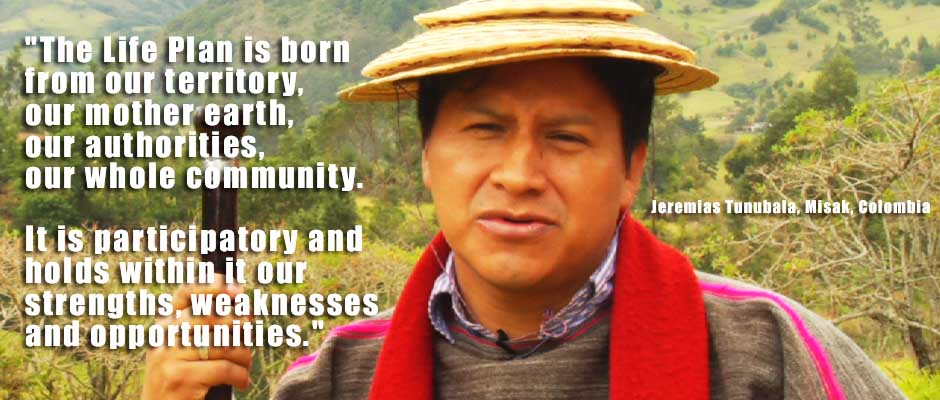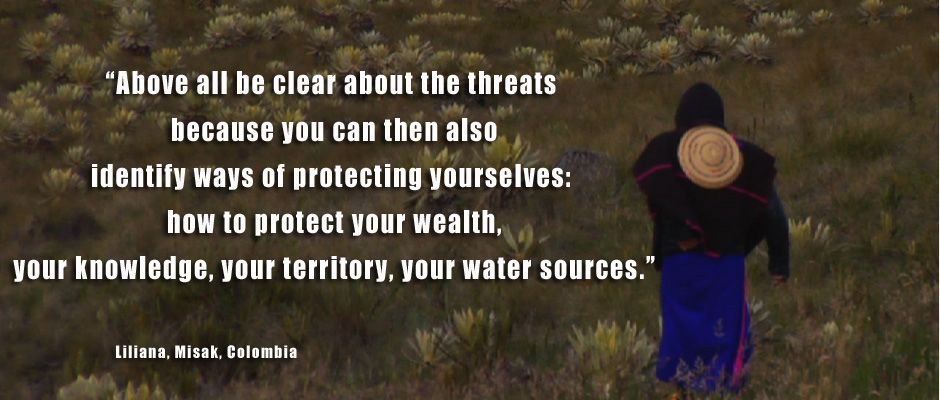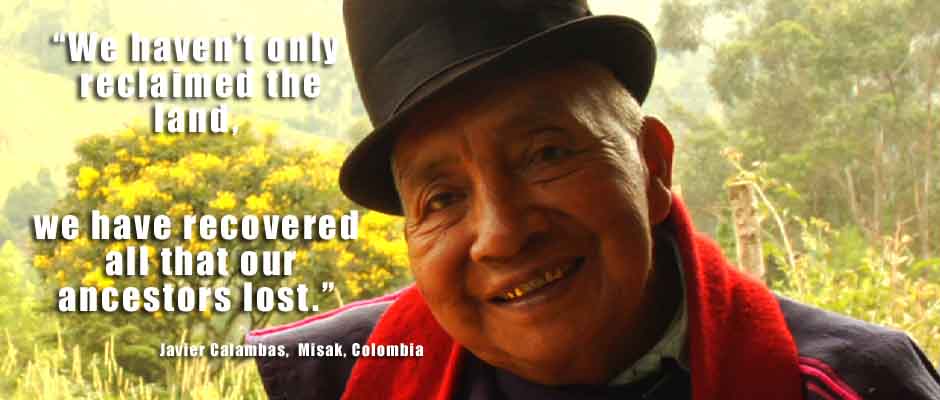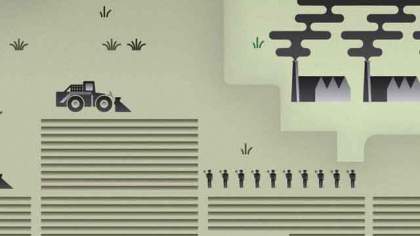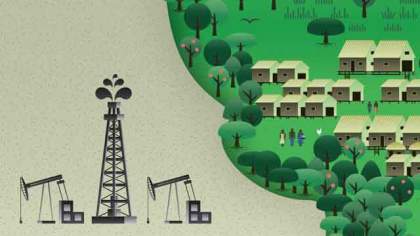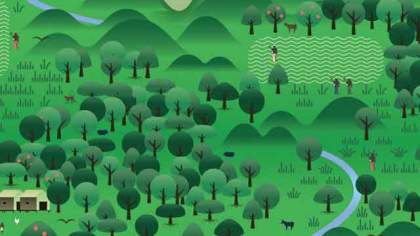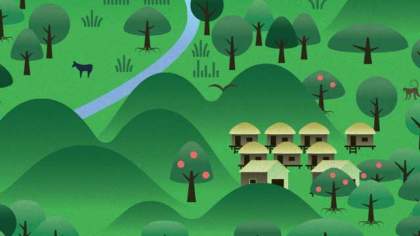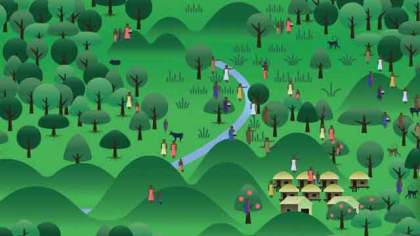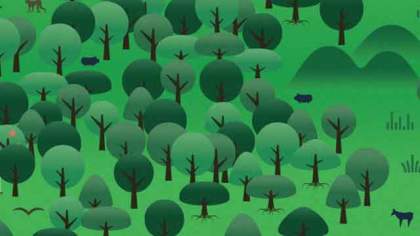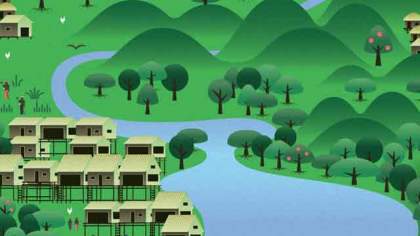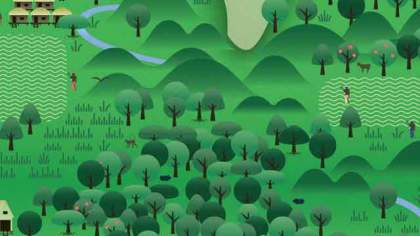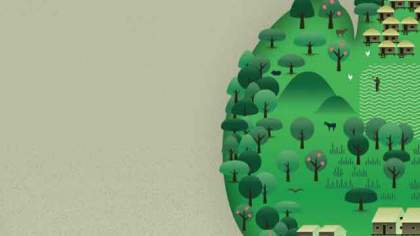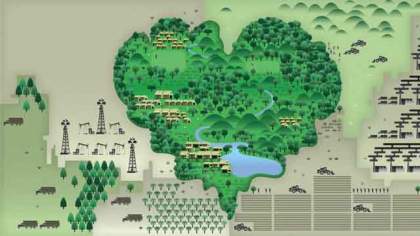-
What is Life Plan (Plan de Vida) about?
The Misak are an indigenous people whose territory is located in Cauca, Colombia. As with many indigenous peoples in Latin America, the Misak lost large parts of their territory during colonial rule. In the 1970s, they started a process of land reclamation and were eventually successful in gaining formal land rights recognition. Since then, the Misak have developed their Life Plan as a tool for self-determined development to ensure their gains would be preserved for future generations.
Length of video
23 minutes.
Download 'Life Plan' here.
Watch in French, Spanish, Indonesian and Swahili
Suggestions for Discussion Questions after community screenings
- What does 'development' mean to you and how does this differ from the meaning of 'development' used by government or companies?
- What are the 3 key steps to the Plan de Vida described in the video? How could these 3 steps apply to your community?
- What ways can you ensure everyone in the community is involved in developing and carrying out your long-term vision?
- How can you protect your culture and identity?
- What is the history of your people on the territory?
- What activities / practices / knowledge are important to your community? How have these helped you to live well over time and into the future?
Suggestions for Follow-up Activities after community screenings
- Travel your Territory. With as many of the community as are physically able, walk / paddle the entire boundary of your territory, relearning about the stories and the sacred places.
- Form an information-gathering team and develop a questionaire about the hopes, aspirations, skills and needs of the community. The team then interviews, collates and reports back to the whole community on their findings.
- Celebrate your Culture. Hold a cultural event to share food, stories, cosmology, traditional skills, games etc. Invite the community / neighbouring communities / wider public?
-
Documents and Downloads
Thinking Together For Those Coming Behind Us: An Outline Plan for the Care of Wapichan Territory
After years of painstaking work and multiple community consultations, the indigenous Wapichan people of southern Guyana have set out agreements and proposals for caring for their territory in a ground-breaking plan titled Baokopa’o wa di’itinpan wadauniinao ati’o nii (Thinking together for those coming behind us). This innovative grass-roots effort has resulted in more than one hundred inter-community agreements on sustainable land use, including proposals to establish an extensive Wapichan Conserved Forest over old-growth rainforest in the eastern part of their territory. Discussions and agreements also involved documenting a community vision for community land use, livelihood and culture in Wapichan Wiizi (Wapichan territory) in 25 years’ time (a document of the indigenous peoples of the South Rupununi, 2012).
Thinking Together For Those Coming Behind Us (Summary)
This brochure summarises key contents of the Wapichan people's territorial plan 'Baokopa’o wa di’itinpan wadauniinao ati’O Nii' ('Thinking Together For Those Coming Behind Us'). The summary includes examples of agreements made between villages on ways to secure and care for their lands, forests, savannahs, wetlands and mountains and promote self-determined development in Wapichan communities (The indigenous peoples of the South Rupununi, 2012).
Biocultural Community Protocols: A Toolkit for Community Facilitators
This toolkit is for Indigenous peoples, local and mobile communities,and supporting community-based and non-governmental organizations (CBOs and NGOs). It is intended to support communities to secure their rights and responsibilities and strengthen customary ways of life and stewardship of their territories and areas. It is directed primarily towards facilitators from the communities themselves or from supporting organizations with whom they have long-standing and positive relationships. Produced by Natural Justice, their vision is the conservation and sustainable use of biological diversity through the self-determination of Indigenous peoples and local communities (Eds. Holly Shrumm & Harry Jonas. www.naturaljustice.org, 2012).
Other videos
Fever: Organisation (English)
Part 3: Organisation gives examples of organisational tools and strategies used by indigenous peoples to protect their cultures, territories and rights. The film covers: awareness raising; organisational tools; networks and communication; petitions; legal cases and international law; unity, life plan; spirituality; movements. (LifeMosaic, 2010)
Revival
Revival, a film from MELCA Ethiopia and The Gaia Foundation, follows a meeting of African Sacred Natural Site Custodians in the stunning highlands of Bale, Ethiopia. There they gathered to celebrate MELCA Ethiopia's ten years working to revive Sacred Natural Sites and customary law in Ethiopia, to exchange knowledge, stories and experiences. Featuring interviews with Sacred Natural Site Custodians and Earth Jurisprudence practitioners and vibrant footage from Ethiopia's unique highland ecology, Revival takes us to the heart of efforts to regenerate biocultural diversity and restore a respectful relationship with Earth in Africa (The Gaia Foundation, 2015).
Related links
Center for Indigenous Knowledge and Organizational Development (CIKOD)
The Center for Indigenous Knowledge and Organizational Development (CIKOD) is a Ghanaian NGO working to develop methodologies for the strengthening of traditional authorities and civil society organizations to facilitate sustainable grassroots organizational development that gives voice to the poor and vulnerable rural families.
Community Protocols
Protocols developed by Indigenous peoples or mobile or local communities ("community protocols") are gaining recognition as a useful means by which a range of peoples and communities can engage with others according to their values, and on the basis of customary, national and international rights and responsibilities. This website is intended for Indigenous peoples, mobile and local communities, their community-based and non-governmental organizations, governmental agencies, and researchers, among others, to: - Provide information about community protocols, - Share good practice about the development and use of community protocols, - Highlight the questions that peoples and communities are raising about community protocols, - Provide a range of resources relevant for the development and use of community protocols, and - Act as a clearing house for protocols developed by Indigenous peoples and local communities.
COMPAS
COMPAS (comparing and supporting endogenous development) is an international network implementing field programmes to develop, test and improve endogenous development methodologies. Endogenous development is based on local peoples' own criteria of development, and takes into account the material, social and spiritual well-being of peoples.
Life Plan - Territories of Life
How the Misak indigenous people of Colombia are carrying out their Life Plan, a long-term, community-led plan for self-determined development on their territory.

